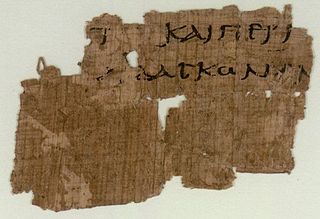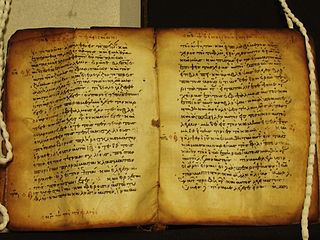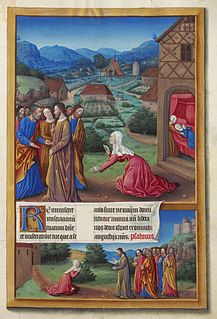
The Gospel according to Matthew, also called the Gospel of Matthew, or simply Matthew, is the first book of the New Testament and one of the three synoptic Gospels. It tells how Israel's Messiah, Jesus, comes to his people and forms a community of disciples, of how he taught the people through such events as the Sermon on the Mount and its Beatitudes, and how Israel becomes divided and how Jesus condemns this hostile Israel. This culminates in his departure from the Temple and his execution. At this point the whole people reject Jesus, and on his resurrection he instead sends the disciples to the gentiles.

Matthew 4 is the fourth chapter of the Gospel of Matthew in the New Testament of Christian Bible. Many translations of the gospel and biblical commentaries separate the first section of chapter 4 from the remaining sections, which deal with Jesus' first public preaching and the gathering of his first disciples.

Matthew 4:4 is the fourth verse of the fourth chapter of the Gospel of Matthew in the New Testament. Jesus, who has been fasting in the desert, has just been tempted by Satan to make bread from stones to relieve his hunger, in this verse he rejects this idea.

Mark 7 is the seventh chapter of the Gospel of Mark in the New Testament of the Christian Bible. This chapter explores Jesus' relationships with both fellow Jews and Gentiles. Jesus speaks with the Pharisees and scribes, and then with his disciples, about defilement, and then heals two gentiles.

Mark 8 is the eighth chapter of the Gospel of Mark in the New Testament of the Christian Bible. It contains two miracles of Jesus, Peter's confession that he believes Jesus is the Messiah, and Jesus' first prediction of his own death and resurrection. It is the middle chapter of the gospel but its significance is variously understood: for example the Jamieson-Fausset-Brown Bible Commentary calls it a "section of miscellaneous matter" whereas many commentators treat it as a turning point where Mark's description of Jesus as teacher and miracle worker gives way to his focus on the role of Jesus' death and the difficult nature of his teachings.

John 6 is the sixth chapter of the Gospel of John in the New Testament of the Christian Bible. It records Jesus' miracles of feeding the five thousand and walking on water, the Bread of Life Discourse, popular rejection of his teaching and Peter's confession of faith. The final verses anticipate Jesus' betrayal by Judas Iscariot.
Matthew 15:21 is a verse in the fifteenth chapter of the Gospel of Matthew in the New Testament.

Matthew 8:10 is the tenth verse of the eighth chapter of the Gospel of Matthew in the New Testament. This verse continues the miracle story of healing the centurion's servant, the second of a series of miracles in Matthew.
Matthew 9:22 is a verse in the ninth chapter of the Gospel of Matthew in the New Testament.
Matthew 12:3 is the third verse in the twelfth chapter of the Gospel of Matthew in the New Testament.
Matthew 9:34 is a verse in the ninth chapter of the Gospel of Matthew in the New Testament.
Matthew 15:7 is a verse in the fifteenth chapter of the Gospel of Matthew in the New Testament.

Matthew 12:12 is the twelfth verse in the twelfth chapter of the Gospel of Matthew in the New Testament.
Matthew 12:27 is the 27th verse in the twelfth chapter of the Gospel of Matthew in the New Testament.
Matthew 12:33 is the 33rd verse in the twelfth chapter of the Gospel of Matthew in the New Testament.

Matthew 15:23 is a verse in the fifteenth chapter of the Gospel of Matthew in the New Testament.

Matthew 15:24 is a verse in the fifteenth chapter of the Gospel of Matthew in the New Testament.

Matthew 15:27 is a verse in the fifteenth chapter of the Gospel of Matthew in the New Testament.
Matthew 11:4-6 is a set of verses in the eleventh chapter of the Gospel of Matthew in the New Testament.
Matthew 14:15-21 is a set of verses in the fourteenth chapter of the Gospel of Matthew in the New Testament.











